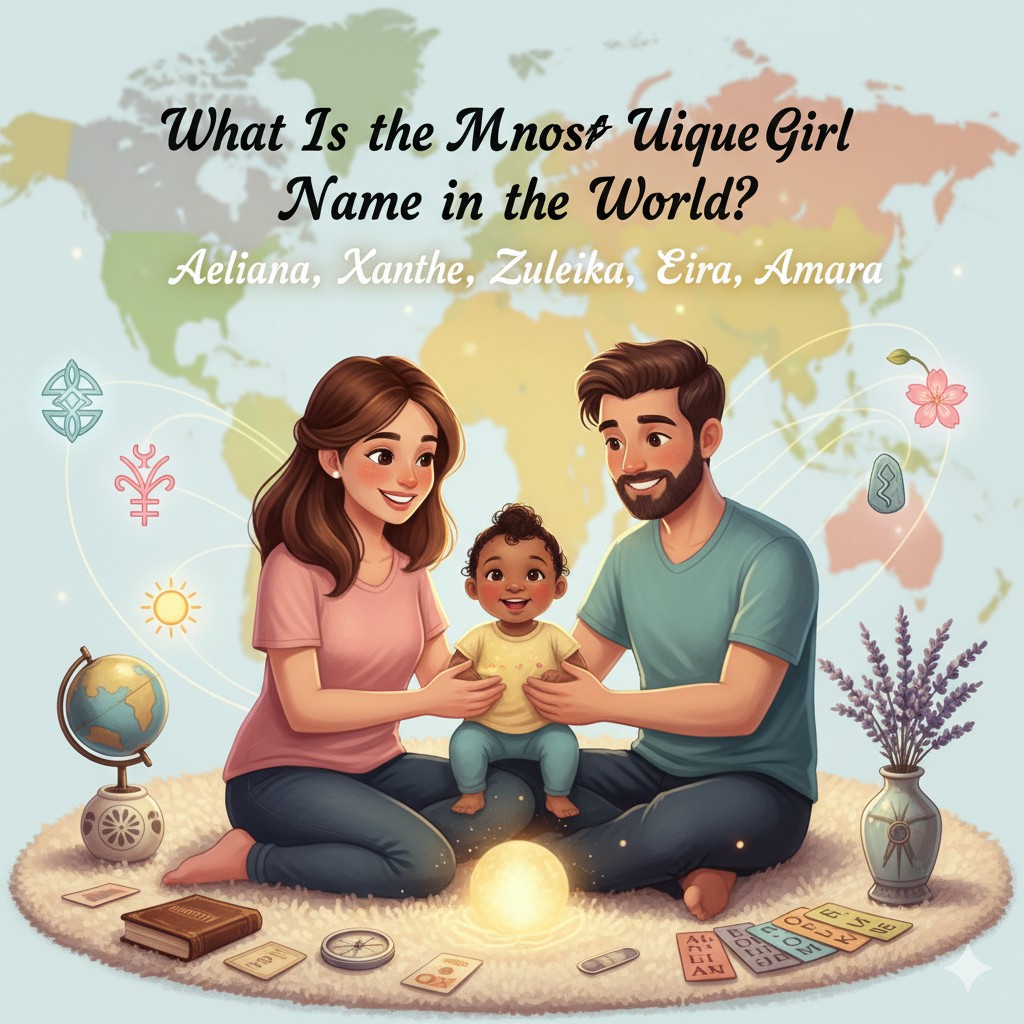What is the most unique girl name in the world?
Naming a daughter is one of the most exciting and profound decisions a parent makes. It’s an act of love, a declaration of hope, and the first indelible gift you bestow upon your child. In a world of fleeting trends, the desire to find a truly special, one-of-a-kind name for a girl—something that will set her apart and carry deep personal meaning—has never been stronger.
Names are more than just labels; they are miniature biographies, encapsulating culture, heritage, and personal creativity. They connect us to our past and project our identity into the future. For many parents, a "unique" name holds strong appeal because it suggests individuality, strength, and a promise that their daughter will stand out in a crowd. It’s a subtle rebellion against the top-ten list, a choice to celebrate distinctiveness. This desire to avoid a name shared by half the playground has driven a fascinating exploration into global archives and the creation of entirely new monikers.
We'll journey through the concept of the most unique girl name in the world, exploring how different cultures shape rare choices and offering practical tips for parents seeking the perfect balance of distinctiveness and timeless beauty. From ancient names inspired by mythology to modern, inventive spellings, you'll gain the insights needed to choose a name that is as special as your daughter.
What Is the Most Unique Girl Name in the World?
The idea of the "most unique girl name in the world" is a beautiful paradox, because true uniqueness is fleeting. As soon as a name is used, its uniqueness diminishes. Moreover, "unique" is a subjective term that can mean several things:
Statistically Rare: A name given to only a handful of children in a specific country in a given year, such as Ourania (Greek, meaning "heavenly") or Zuleika (Arabic/Persian, meaning "fair, brilliant").
Culturally Specific/Historically Uncommon: Names that are common in one culture but virtually unheard of in others, or names that have fallen out of use over time, like the Anglo-Saxon Ethelreda (meaning "noble counsel").
Newly Invented: Completely original names created by parents, often by combining elements of other names or simply inventing a new spelling or sound—names that may not even appear in any official database.
While we can't pinpoint a single, definitive most unique girl name in the world, the distinction often falls to names that combine factors like originality, striking pronunciation, and a profound meaning. These names often feature uncommon letters (X, Z, Q) or belong to deep cultural histories outside the mainstream. The unique quality lies not just in their rarity, but in their deliberate choice to embody something extraordinary.
How Do Cultures Influence Unique Girl Names?
The world's naming traditions are a tapestry of cultural influences on girl names, often making the most common names in one region the rarest in another. Cultural traditions provide a rich reservoir of unique names, linking a child to their heritage in a profound way.
African and Arabic Cultures: Names from languages like Swahili or Igbo often have strong, aspirational meanings. For instance, the Nigerian Igbo name Ifeoma means "good thing," and the Arabic name Roya means "dream" or "vision."
These names are not unique within their originating cultures but can feel distinctly rare and exotic globally, carrying an inherent dignity and clear meaning. Nordic and Celtic Cultures: These traditions offer beautiful, ancient names tied to nature, mythology, and history. The Welsh name Eira means "snow," a simple, elegant choice.
Similarly, the Irish name Aoife (pronounced EE-fa) means "beautiful, radiant," and while common in Ireland, it's a rare and lyrical choice elsewhere. Japanese Culture: Traditional names often combine Kanji characters to create unique and profound meanings related to nature, virtue, or seasons. Names like Himari (often meaning "sunflower") or Akari ("light, brightness") are beautiful, yet uncommon outside of Japan.
In many regions, naming ceremonies are central, where the chosen name carries a specific cultural weight, sometimes reflecting the day of the week the child was born, a recent family event, or a spiritual aspiration. This deeply embedded cultural meaning is what elevates a name from merely rare to truly unique and meaningful.
What Are Examples of Rare Girl Names?
For parents seeking an extraordinary name, exploring lists of rare girl names that draw from diverse wellsprings is essential.
Names of Ancient, Mythological, or Literary Origin
These names evoke a timeless quality, often rooted in powerful female figures or majestic concepts:
Aeliana (Latin/Roman): Derived from the Roman family name Aelius, meaning "sun." It’s elegant and has a flowing sound.
Xanthe (Greek): Meaning "golden" or "yellow."
The unusual starting letter immediately sets it apart. Lyra (Greek/Celestial): Named after the constellation and the musical instrument (lyre).
It's celestial and melodic. Persephone (Greek Mythology): The queen of the underworld; a strong, dramatic name.
Cordelia (Celtic/Literary): Meaning "heart" or "daughter of the sea," made famous by Shakespeare.
Names Inspired by Nature and Seasons
Drawing inspiration from the natural world creates names that are vivid and evocative:
Elowen (Cornish): Meaning "elm tree."
Clover (Old English): A charming, nature-inspired name that evokes good luck.
Vesper (Latin): Meaning "evening star."
Hyacinth (Greek/Botanical): A beautiful flower name that is far less common than Rose or Lily.
Multicultural Gems with Universal Appeal
These names are rare in Western countries but have gorgeous meanings and easy pronunciation:
Amara (Multicultural): Means "grace" in Sanskrit and "immortal" in Igbo.
Zahra (Arabic): Means "shining, brilliant, bright."
Eudora (Greek): Meaning "generous gift."
Selah (Hebrew/Biblical): A word found in the Psalms, generally interpreted as a musical or reading direction, or to "pause and reflect."
| Unique Name | Meaning | Origin |
| Aeliana | Sun | Latin/Roman |
| Xanthe | Golden, Yellow | Greek |
| Zuleika | Fair, Brilliant | Arabic/Persian |
| Eira | Snow | Welsh |
| Amara | Grace, Immortal | Sanskrit/Igbo |
| Niobe | Crying out loud, Pine-like | Greek Mythology |
| Sunniva | Sun gift | Old English/Scandinavian |
How Can Parents Choose a Unique Name for Their Daughter?
Choosing a unique name is a delicate balancing act. The goal is distinction, not necessarily difficulty. Here are practical tips on how to choose a unique baby name for a girl:
1. Research Cultural or Historical Names
Dig deeper into your own family's history or cultural background. Look for names that were popular a century ago or those from a less-spoken language within your heritage. A historical name that has slipped out of the top rankings can feel beautifully unique and comes with a built-in story.
2. Check Name Meanings and Origins
A truly unique name should be special and meaningful. Research the etymology; a name like Allegra ("joyful" in Italian) or Vera ("truth" in Russian/Latin) offers a beautiful aspiration for your daughter's character.
3. Avoid Overly Complex Spellings
While you might be tempted to use a highly creative spelling to ensure rarity (e.g., Xanthe vs. Zantee), remember the impact on your child. Uniqueness balanced with usability is key. Names with unusual but intuitive spellings are often the most successful. A child shouldn't have to correct people’s pronunciation or spelling constantly.
4. Consider Nicknames and Flow
Say the full name—first, middle, and last—aloud. Does it flow well? Does it offer charming nickname possibilities? A long, unique name like Evangelina could easily be shortened to the familiar Eva or the unique Lina.
5. Utilize Digital Resources
Tools like baby name databases, cultural archives, and historical census records can be invaluable. Look at the popularity ranking of a name in different countries. A name that is ranked #5000 in your country is definitively a rare girl name choice.
Why Do People Prefer Unique Baby Names?
The growing trend toward unique girl names is driven by deep-seated psychological, social, and emotional factors.
Psychological Reasons: Individuality and Self-Expression
In an increasingly standardized world, parents want their children to embody individuality. A distinct name is seen as an early declaration that the child is not just one of many, but a unique person with a special destiny. The name becomes a form of self-expression for the parents and a foundational component of the child’s identity.
Social Reasons: Creating a Strong Identity
Choosing a unique baby girl name helps avoid the common issues associated with overly popular names (e.g., being one of five 'Emmas' in a classroom). A unique name can help a child stand out, ensuring she is remembered and recognized immediately. This can lead to a perceived stronger identity and sense of personal brand.
Emotional Reasons: Special and Meaningful
Ultimately, the choice is deeply emotional. Parents want their daughter's name to feel like it was chosen just for her. A name that has a meaningful story, a rare origin, or a beautiful sound that resonates with the family’s values often feels more special than a name chosen merely for its familiarity or current popularity.
FAQ Section
Are unique names harder for children to adapt to?
Not necessarily. While a child may have to repeat or spell out a truly rare name more often, most children adapt quickly. The positive association with a distinctive name and its unique meaning often outweighs the occasional need for clarification. The key is that the name is pronounceable and not overly burdensome.
Do unique names affect job opportunities or social life?
Research is mixed. Some studies suggest overly complex or unusual names may subconsciously bias recruiters, while others show that unique names associated with creativity and confidence can be an asset, helping a person stand out. A beautiful, strong, but rare name like Aurelia (golden) is unlikely to cause issues.
Can a name be both unique and traditional?
Absolutely. Many unique baby girl names are actually classic names that have simply fallen out of fashion, such as Theodora or Winifred.
How can parents ensure a unique name is still easy to pronounce?
Focus on names with phonetically simple letter combinations, even if the combination is rare. A name like Eira (EYE-ra) or Carys (KAH-riss) is rare but has sounds that are familiar to English speakers, making them easier to learn and remember than names with complex consonant clusters or silent letters.
Conclusion
The search for the most unique girl name in the world is a personal, passionate quest that reflects a parent's desire to give their daughter a head start in standing out. The journey takes us through history, across continents, and into the heart of cultural and creative expression. The appeal of rare names is the promise of individuality, a strong identity, and a profound connection to a beautiful meaning or heritage.
The key to a successful choice is balancing creativity with practicality. While it’s tempting to choose the rarest option possible, the most perfect, unique name is ultimately one that carries a deep, positive meaning for the family and is bestowed with love. It's the name that best fits your daughter's burgeoning identity, a personal signature for the wonderful life ahead.












MeaningMatters
on October 03, 2025I agree the most unique name is the one with the most meaning. We're leaning toward **Lyra** for its celestial connection. Great tips on checking the origin.
FutureAuntie
on October 03, 2025Sharing this with my sister! She’s due soon and has been vetoing every common name. She needs this global perspective.